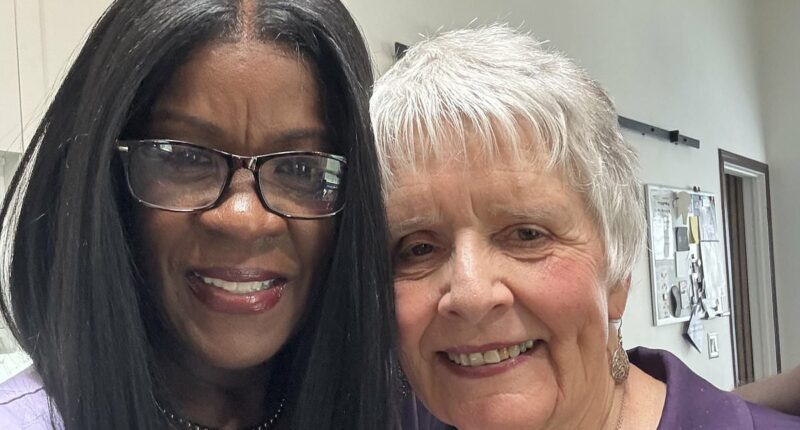Share this @internewscast.com
Phyllis Jones spent nearly 10 years watching her mother succumb to Alzheimer’s.
Decades earlier, her mother had taken care of her grandmother the same way, as she was also struck by the most common form of memory-robbing dementia.
Now 66, Jones was headed toward being caught in the generational cycle herself. Like 100 million Americans, the Illinois grandmother-of-two was prediabetic and about 30 pounds overweight. Combined with family history, she had three of the most common risk factors for dementia.
Just a few miles away, Patty Kelly cared for her mother for ‘a very painful seven years’ while she, too, battled dementia.
‘The hardest time to me was when my two sons came to visit her, and she looked up at them and had no idea who they were. They were in their 30s at the time, and they walked out of the room crying,’ Kelly, now 81, told the Daily Mail.
‘At that point it was like, “How can I make sure they don’t go through that with me?”‘
In an effort to break the cycle, Jones and Kelly took part in the US POINTER trial, the country’s most comprehensive study showing simple lifestyle changes like diet and exercise can stave off cognitive decline and dementia.
The results, unveiled this week at the Alzheimer’s Association International Conference (AAIC) in Toronto, showed people who followed a strict routine of aerobic and strength exercises, kept to a careful diet and formed social connections for two years had improved cognitive scores.

Phyllis Jones (left) and Patty Kelly (right) both participated in the groundbreaking US POINTER trial
They also slowed their brains’ aging by one to two years on average.
Both women told the Daily Mail they lost weight, lowered their cholesterol and improved their mental health since starting the first-of-its-kind study, and they plan to continue following the routines they created in an effort to ward off dementia.
They also believe they may have broken their families’ generational curses and changed the predetermined paths toward dementia they were on.
‘Finding out about the US POINTER study was one of the best things that could have happened to me,’ Jones said.
‘I’m forever grateful.’
Dr Rachel Whitmer, study co-author and chief in the division of epidemiology at the University of California, Davis, told the Daily Mail that attracting subjects ‘was a tall order’.
‘We’re recruiting people who don’t have a healthy lifestyle, but have a family history,’ Dr Whitmer explained.
‘Even though they don’t already have a healthy lifestyle, they’re willing to come in here and make a change.’
About two in five Americans over the age of 55 years will eventually develop dementia, estimates suggest.
Around 514,000 Americans are currently diagnosed with dementia every year, a figure that is expected to double to 1 million by 2060.
Of the estimated 7.2 million people currently living with dementia, the vast majority have Alzheimer’s disease, a progressive brain disorder that gradually destroys memory, thinking skills and even the ability to carry out simple day to day tasks.
US POINTER was inspired by a Finnish study first released a decade ago called FINGER. Like POINTER, the study enrolled 1,260 older adults who all had risk factors for dementia.
The FINGER study found people who followed the lifestyle interventions had 25 percent improvement in overall cognitive function compared to the control group.
‘We needed to figure out a way to do it here,’ Dr Whitmer said.
The US POINTER study enrolled 2,111 adults from five sites across the US and followed them for two years.

The above chart shows changes in cognitive scores over time among people who implemented structured changes and those who implemented self-guided ones

One ‘structured’ group followed a strict exercise and diet plan and had regular meetings with other members of their ‘teams’ and their doctors to track their progress. The other ‘self-guided’ group made their own changes.
One of the trial sites was Chicago, where Jones and Kelly met in 2022 as members of the structured group.
Despite never meeting previously, the women turned out to live within five miles of each other in the Chicago suburbs. They started going to their local Y for Silver Sneakers exercise classes designed for seniors.
Jones said she had ‘trouble making it through the first 30 minutes’ of the group classes when she first started out.
In the beginning of the study, Jones tried a variety of muscle strengthening classes like barre and yoga but had to wear braces on her knees, ankles and back to support her weak joints.
‘I don’t need any of that stuff now,’ she said.
Jones also noticed she went from staring at the clock during a workout and waiting for it to be over to time flying by, especially when she exercises with her VR headset.
While Kelly would frequently take walks around her neighborhood, she had never focused brisk walking, which raises heart rate over time and improves fitness levels.
The POINTER team showed her how to gradually increase her pace.
‘That was big for me,’ she said.

The above map shows dementia risk divided by geographic region
Participants were also advised to follow a ‘MIND’ diet, which combines tenets of the Mediterranean and DASH (dietary approaches to stopping hypertension) diets.
It’s been shown to lower dementia risk by emphasizing brain-healthy foods such as leafy green vegetables, berries, nuts, olive oil, lean fish and whole grains.
As part of the study, participants were given questionnaires on their dietary habits and assigned a score from zero to 14, with higher scores indicating a more brain-healthy diet.
Kelly initially scored a five, which she later found out ‘was one of the worst scores possible.’
But after two years, the MIND diet ‘is like a Bible to me now,’ Kelly said.
By the end of the study, she scored 13.3.
She still keeps the chart of recommended foods on her fridge and makes copies when she travels. Even when she arrived at AAIC as part of the POINTER reveal, she had a copy of the diet in her luggage.
‘For me the big thing was the MIND diet and how it helped me, you know,’ Kelly told the Daily Mail. ‘I saw my cholesterol go down, so that was so exciting for me.’

Dr Rachel Whitmer (pictured), study co-author and chief in the Division of Epidemiology at the University of California, Davis told the Daily Mail that US POINTER was the ‘hardest’ but ‘most rewarding’ study she has been part of

Phyllis Jones (pictured) said US POINTER helped her lose 30 pounds and reversed her prediabetes, lowering her risk of developing dementia
Participants were also asked to complete ‘Brain HQ’ cognitive exercises several times per week, which have helped Kelly feel more confident with driving. For the first time in years, her two sons will ride in the car with her instead of insisting on driving themselves.
After the study, Jones has lost 30 pounds, and 11 inches off of her waistline. She’s also no longer prediabetic.
Her family has now adopted her new habits: Her son and daughter have both made adjustments to their diets, and Jones’ 7-year-old granddaughter even insists on having a salad with her school lunch.
‘They’re picking up all these habits and all of these changes that I’m bringing,’ Jones said.
She and Kelly both told the Daily Mail building up the changes they made slowly helped keep them motivated and prevented them from quitting.
Dr Whitmer agrees, saying, ‘What I also love about the study is we didn’t have everyone do everything right away – we built up. We didn’t want them to quit. Getting people to change their behavior is the hardest thing.
‘I think the reason why it worked and people stayed in it was that it was like a gradual ramp up.’
Jones and Kelly became friends throughout the process.
Jones said Kelly is ‘my inspiration – this is how I want to be when I’m 81.’
And they aren’t the only participants to form a newfound bond. Dr Whitmer also noted at least one couple got married during the study period.
‘I think it’s great that people can hold each other accountable,’ she said.
The POINTER team plans to observe the participants for another four years and publish additional studies looking at the reasons behind the improvements. They also plan to expand to 10 additional sites across the US.
‘I’ve been doing this research for 26 years. This was the hardest study to ever do, but the most rewarding,’ Dr Whitmer said.
‘You can’t modify family history, but you can modify some of these risk factors and the way that you live.’











